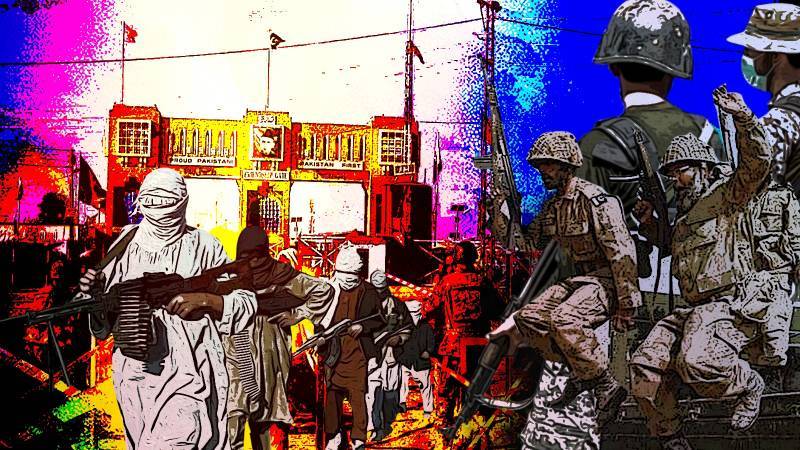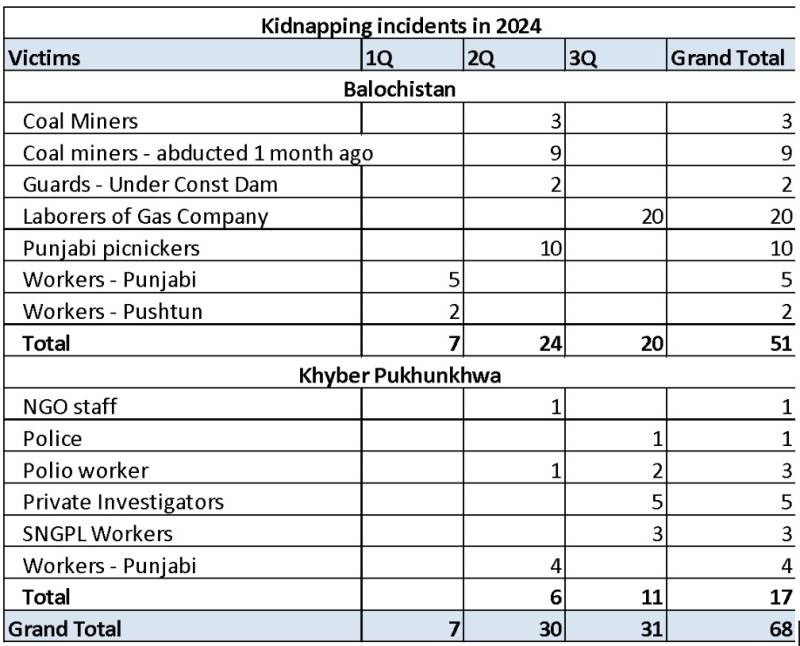
Amid the worsening security situation in Balochistan and Khyber Pakhtunkhwa (KP), two bold and unconventional statements from government officials made headlines this year. The first came in July 2024 from the resolute Chief Minister of KP, Ali Amin Gandapur, who opposed a military operation in the province. Instead, he instructed the police to take decisive action against armed groups. The second statement came in August 2024 from Federal Interior Minister Syed Mohsin Raza Naqvi, who reportedly downplayed the need for a military operation in Balochistan, suggesting that a single Station House Officer (SHO) would suffice to handle the burgeoning terror threat.
For many, these statements were reassuring, reflecting the government's firm resolve to stand strong against the outlaws and its ability to uphold state authority, no matter how formidable the threat. While some security analysts expressed concerns about the government's oversimplification of the terror threats, the majority generally agreed that empowering the police to tackle this challenge was essential. However, the downside of these statements was that they exposed a division in opinion on a highly sensitive strategic issue that demanded a unified approach.
According to the security report issued by the Center for Research and Security Studies (CRSS), Balochistan and KP were the two most affected regions by terror attacks and counter-terror operations, with a 90% surge in violence by the end of the third quarter of 2024. Balochistan saw a dramatic 159% increase in violence, while KP experienced a 77% rise. The civilians accounted for the highest number of fatalities (40%), followed by security personnel (26%), and militants made up only 34%. Additionally, the proportion of attacks targeting civilians, security personnel, and government officials was significantly higher, representing 82% of the total, compared to just 18% resulting from security operations against the outlaws.
Balochistan saw a dramatic 159% increase in violence, while KP experienced a 77% rise. The civilians accounted for the highest number of fatalities (40%), followed by security personnel (26%), and militants made up only 34%.
Of the 187 security personnel who lost their lives to terrorism in the third quarter of 2023, 120 were army personnel and 67 were policemen. Balochistan saw the loss of 61 army personnel and 16 policemen, while KP lost 56 army personnel and 47 policemen. Additionally, a Station House Officer (SHO) was killed in Balochistan, with two SHOs killed in KP. Despite these sacrifices, terrorism continued to thrive, outmanoeuvring security measures and increasing its capacity to strike by developing new methods, tactics, and modes of operation.
In Balochistan, the majority of terror attacks were claimed by the separatist groups, with the Balochistan Liberation Army (BLA) leading, followed by the United Baloch Army (UBA). In August 2024, the BLA once again used a two suicide bombers, including a female attacker, to target an army camp in Lasbela. This marked the third such attack in Balochistan in the past three years, carried out by Mahal Baloch, also known as Zalan Kurd. In an unprecedented move, a Kurdish organisation in Kurdish-controlled Syria dedicated its newly inaugurated women's empowerment centre to Mahal Baloch, honouring her as a symbol of defiance.
In addition to separatist groups, two jihadist outfits, the Islamic State of Pakistan Provinces (ISPP) and Jaish-ul-Adl, were also implicated in three violent incidents. ISPP claimed responsibility for two attacks: one involving the killing of two policemen with an IED in Kulachi town, and another in which they shot and killed a man, Qari Inayatullah, in Quetta, accusing him of being an informer. The Iran-based militant group Jaish-ul-Adl, which operates mainly in the Sistan-Baluchestan region, was allegedly responsible for killing five Afghan nationals and hanging their bodies on electric poles in Chagai district.
For the first time in a decade, the Balochistan Liberation Army (BLA) conducted an operation in a Pashtun-majority area, Musakhel, (a district on the border with Punjab) where they intercepted several buses and trucks on the Loralai-Dera Ghazi Khan highway, shooting 23 people—mostly labourers —after confirming their ethnic identity. Both the suicide attack on the army camp in Lasbela and the massacre of 23 passengers in Musakhel occurred on August 26, 2024, the death anniversary of Nawab Akbar Bugti, a Pakistani politician and the Tumandar (head) of the Bugti tribe of Baloch people. Around nine Fidayeen (as identified by the BLA) carried out the army camp attack in Lasbela, while nearly 35-40 BLA militants executed the massacre in Musakhel. Notably, the distance between Lasbela and Musakhel is over 600 kilometres, and the coordination of these attacks involving such large numbers of insurgents points to the growing strength and expanded area of influence that BLA now commands.
Both the suicide attack on the army camp in Lasbela and the massacre of 23 passengers in Musakhel occurred on August 26, 2024, the death anniversary of Nawab Akbar Bugti, a Pakistani politician and the Tumandar (head) of the Bugti tribe of Baloch people.
A new strategy adopted by Baloch separatists and Jihadi militants involves targeting poor workers and labourers based on their ethnic backgrounds. In the past three months, 35 Punjabi workers employed in construction, coal mining, gas fields, hairdressing, and embroidery have been attacked and killed. A Sindhi businessman, too, became a victim of such an attack. Besides killings, these militant groups have resorted to kidnapping workers for the same ethnic reasons.
This year alone, at least 68 people, mostly workers, were kidnapped from Balochistan and Khyber Pakhtunkhwa (KP), as detailed in the table below. Notably, two Pashtun workers were abducted from Balochistan, while four Punjabi workers were kidnapped from KP. The Balochistan Liberation Army (BLA) and Tehrik-eTaliban Pakistan (TTP) claimed responsibility for these kidnapping incidents. On 21st June 2024, ten Punjabi picnickers were abducted from a picnic spot in Shaaban near Harnai, later revealed to be the work of the BLA. Similarly, on July 3, 2024, a TTP affiliate released a video showing four labourers they had kidnapped from Tank district in KP, where they had been working on high-voltage transmission lines. Out of the 14 labourers initially abducted, the TTP retained four from Chishtian, Punjab.

In Khyber Pakhtunkhwa (KP), the violence took various forms, similar in essence but different in appearance. While Baloch separatists targeted individuals based on ethnicity, militants focused on religious identity in their attacks. In the third quarter of 2024, sectarian violence in the Kurram district claimed 96 lives, and approximately an equal number of people were wounded. Militants also targeted police and Frontier Corps (FC) personnel in the area, killing two and injuring 12.
During the sectarian clashes between Sunni and Shia tribes from September 20 to 28, KP Chief Minister Ali Amin Khan Gandapur repeatedly assured the public that serious efforts were being made to maintain law and order. However, no significant police intervention was observed to quell the violence. The KP government consistently urged local tribal jirgas to step in and mediate peace between the warring factions. In a subtle admission of the police force’s limitations, Chief Minister Gandapur remarked: “After the improvement of the law and order situation in southern districts, more check posts will be handed over to the police. However, before that happens, there is a need for enhancing the capabilities of the police.”
This statement contradicted his earlier stance, in which he rejected military intervention and instructed the police to take action against armed groups throughout the province.
While militants are continuously forging alliances with various extremist groups, united by a shared objective of weakening the state apparatus to establish control over most of the erstwhile federally administered tribal areas (FATA) regions, the government's counter-operations are unlikely to succeed if key stakeholders remain divided and unprepared.
A recent cautionary example is the collapse of the Afghanistan government in 2021, where a well-equipped military force of 300,000 men, with access to advanced weaponry left behind by the withdrawing US forces, was unable to prevent its downfall. This underscores the critical need for unified and coordinated efforts, prioritising national interests over individual or group agendas. The people of Pakistan, especially those in Balochistan and Khyber Pakhtunkhwa deserve peace, not petty politics.

